Greetings everybody,
This edition of The Sewing Machine Newsletter is Part 4 of our series on the sewing machine landscape as it stands in 2024. For Part 4 I have decided to group together two Japanese companies, Baby Lock and Brother, for reasons that should be apparent by the end of the article.
I hope you find it helpful.
-Cale
Brother
In my opinion, Brother’s true strength lies in their embroidery machines. The design of these machines prioritizes ease of use, which allows the sewist to do high-quality embroidery at home with the least amount of fuss possible. As someone who sells machines for a living, ease of use is something I value a ton. Sewing and embroidery machines are complicated pieces of technology; designing the machines so that the layperson can operate them with minimal fuss and frustration is key.
For example, their embroidery machines are equipped with the best needle threader in the industry. The touchscreen is large and presents a clear color image of the embroidery design, so you can see exactly what you’re going to sew before you actually stitch it out. The tools for sizing, rotating, and manipulating the design are intuitive and easy to learn.
If you want an in-depth look at some these features, below is a video of my coworker explaining how the Brother Luminaire has a built-in camera that can scan a drawing and convert it to an embroidery design:
Brother’s weakness is their low-end sewing machines. If you go look at Amazon’s best-selling sewing machines, nearly half of them are made by Brother, most of which cost less than $300. I know there are people out there who have had good experiences with these machines, so I don’t mean to offend. However, I have seen the inside of these machines and have to call it how I see it. Very few are designed with metal housing, which is the most important feature a sewing machine can have.
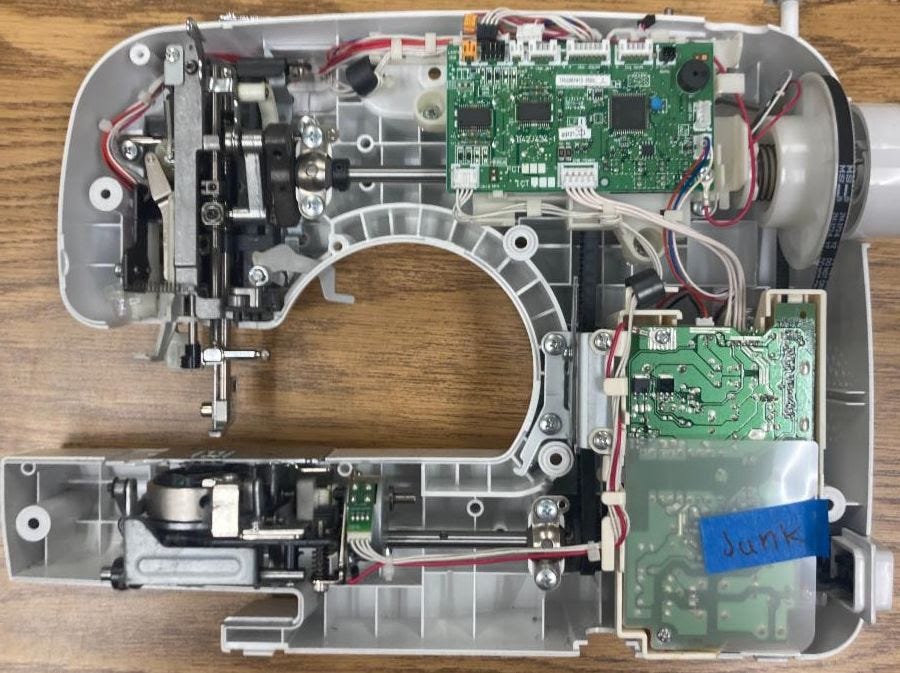
With that said, I am a HUGE fan of Brother machines that lie above the $500 price point. If we’re looking at the $500-1,000 I would argue that Brother makes the best machines in the world. The Brother NS80e at $599 is a personal favorite, as I believe it to be the most intuitive, easy-to-use sewing machine in the world. Then, at $799 you have the Brother PS500, which is the least expensive quality machine with 8.5 inches of throat space. The PS500 is also incredibly easy to use, designed with lots of lighting, an incredible automatic needle threader, and automatic thread trimming.
While I tend to lean towards Janome and Bernina for sewing machines in the $3,000+ price range, I’d be lying if I didn’t acknowledge that Brother also makes an incredible product. It’s difficult to compete with the Janome M7/M8 or the Bernina 7 series, but Brother does a good job differentiating their machines with unique features such as their push-button needle threader, a laser guide projector, and a sensor pen. The laser projects a red line onto the fabric so you know exactly where your seam is headed; with the sensor pen, you press the tip to a spot on your fabric where you want the seam to end, and the machine stops there automatically. You can find both of those features on the Brother BQ3100, which also boasts over 11 inches of throat space. Very cool machine.
Baby Lock
Baby Lock is a Japanese company that exclusively manufactures sergers and cover-stitch machines in their factory in Yamagata City, Japan:
Baby Lock makes the best sergers in the world due to a combination of performance, reliability, and two key innovations: (1) air-jet threading that threads the loopers with a gust of air, and (2) automatic thread delivery, which replaces traditional tension systems and delivers a perfect stitch every time. I have written a detailed article on Baby Lock sergers before, which I will link to you again at the end of this post; however, for the purpose of this article, I am going to focus solely on Baby Lock sewing machines.
Some of you may be thinking, “Cale, you literally just said that Baby Lock only manufactures sergers and cover-stitch machines!” And that is true, I did just say that. However, there are tons of different sewing machines out there with the Baby Lock nameplate, so what exactly is going on?
Tacony Corporation is a company based out of Missouri that distributes Baby Lock sergers and cover stitch machines across the United States. In my opinion, whoever is running the ship at Tacony is a genius. They recognized the strength of the Baby Lock brand name based on the quality of the sergers, then decided to distribute Baby Lock sewing machines as well. But, since Baby Lock doesn’t make sewing machines, Tacony struck a partnership with Janome and Brother.
For sewing machines under the $300 price point, Baby Lock taps Janome. This is a genius move because Janome makes the best machines in the world for under $500. Therefore, anybody who buys a Baby Lock machine at that price point is getting the highest quality product money can buy. Take a look at the photos below of the Janome TM16 and the Baby Lock Joy. The machines are identical except for the paint job.
For sewing and embroidery machines above $500, Baby Lock taps Brother. Again, this is a savvy move because Brother makes fantastic machines above that $500 threshold.
In essence, for every Baby Lock sewing machine over $500, there is a nearly identical Brother equivalent. For example, the Baby Lock Jubilant is essentially the Brother NS80e with a different paint job. The same goes for the Baby Lock Presto II and the Brother PS500, or the Baby Lock Soprano and the Brother NQ1350. The list goes on and on:
Baby Lock Solaris — Brother Luminaire
Brother BQ3100 — Baby Lock Chorus
Baby Lock Ballad — Brother BQ2500
Brother Stellaire XE2 — Baby Lock Meridian 2
Brother Stellaire XJ2 — Baby Lock Altair 2
Brother NQ3700 — Baby Lock Vesta
I say these machines are nearly identical because they are built on the same platform, built in the same factory, and have the same capabilities. However, they are not completely the same because there are differentiating factors that each manufacturer stresses. Specifically, Brother has a partnership with Disney, so a lot of Brother embroidery machines come with built-in Disney embroidery designs, and Baby Lock does not. Meanwhile, Baby Lock differentiates their products by offering the customer a 60-day free trial of their “Love of Knowledge” program, which is essentially an online portal chock-full of instructional videos, project ideas, and other information.
I’ve got to give props to Tacony. Because they decided to tap Janome and Brother, Baby Lock can say that they have the best sergers and coverstitch machines in the world, the best sewing machines in the world for under $1000, the best home embroidery machines in the world, and then a very strong line of high-end sewing machines as the cherry on top. For that reason, if I was opening up a sewing machine retail store and I could only sell products from one brand, I’d probably pick Baby Lock.
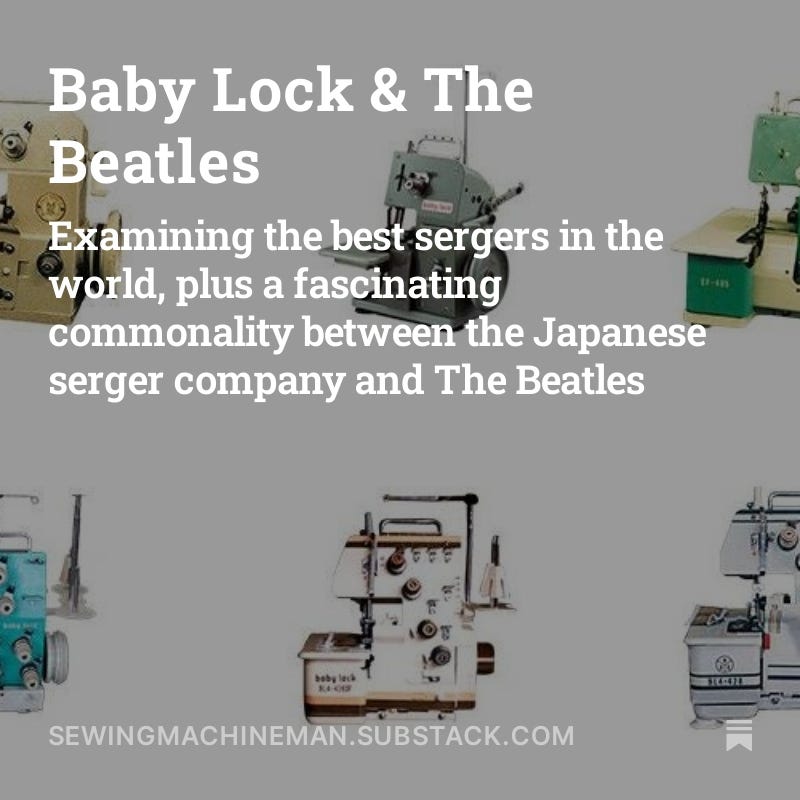
I hope you enjoyed part 4 of the Sewing Machine Landscape article series. Click the buttons below if you would like to read Parts 1-3:
Thank you for reading.
-Cale
Below I have linked two different videos— one of me waxing poetic about Baby Lock sergers, and one of Baby Lock factory workers waxing poetic about Baby Lock sergers.

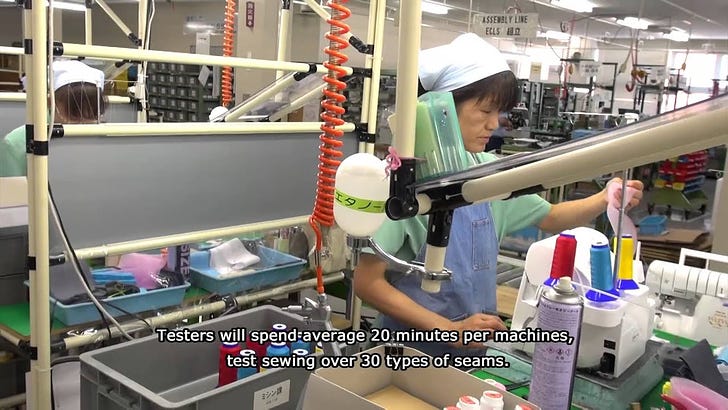


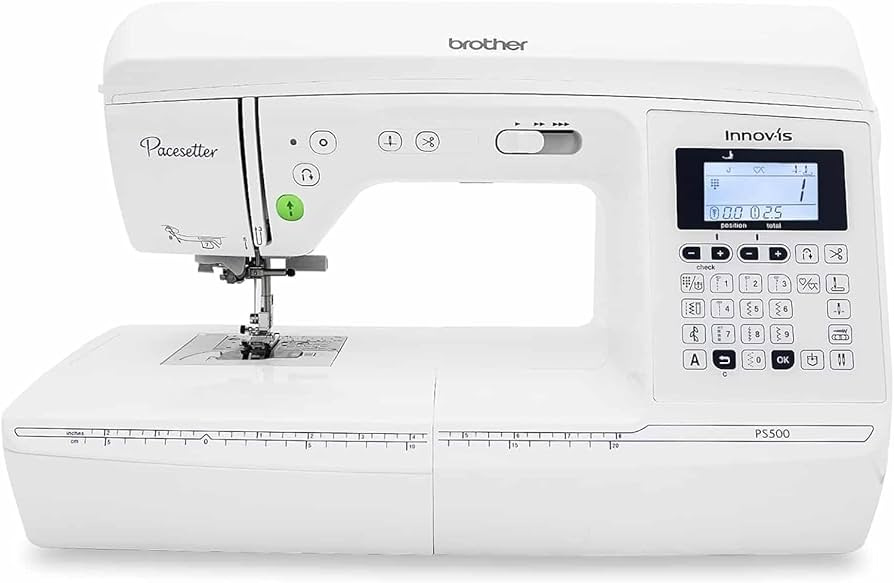
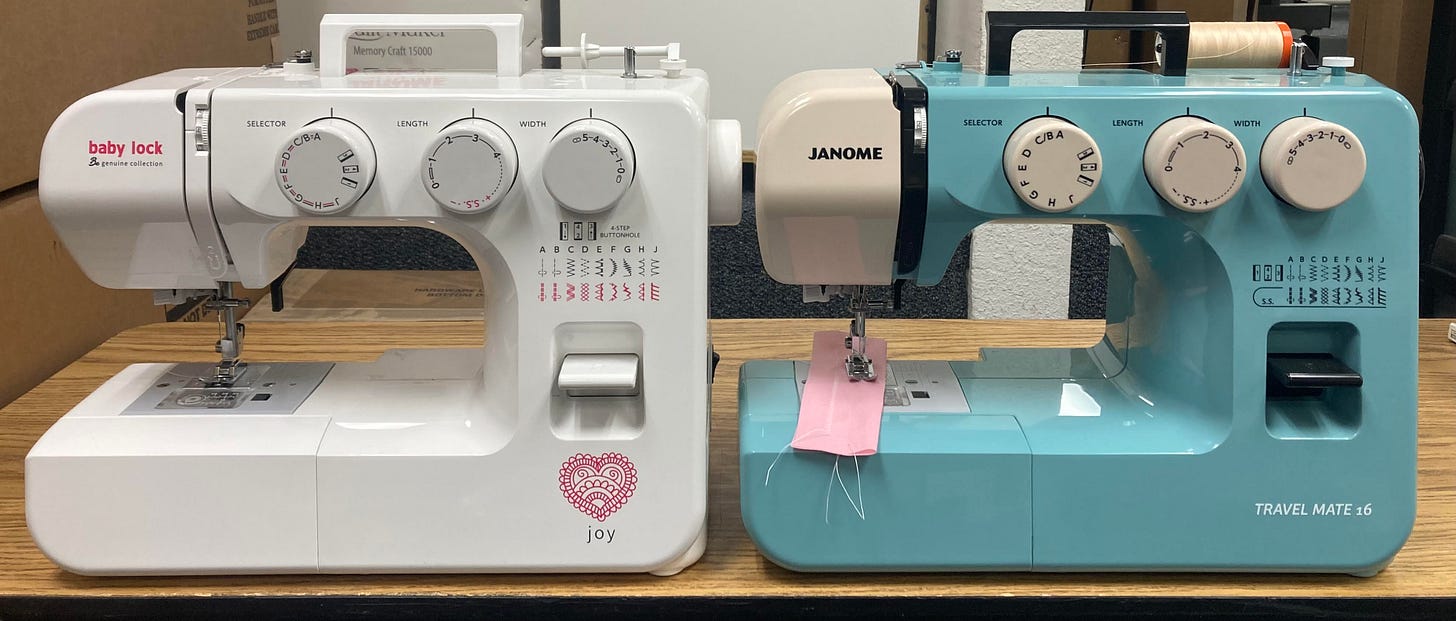
I keep reposting these on Facebook under a post someone was seeking information on inexpensive machines.
I have a babylock, and I think it has a defect. The little flimsy piece that keeps the needle in place has broken 3 times. Who can help me with this issue?